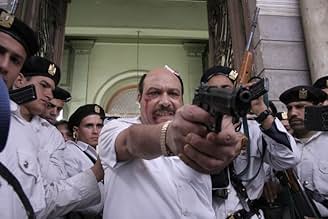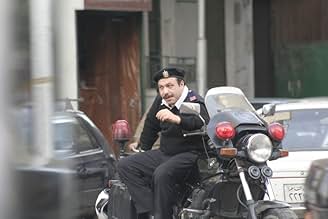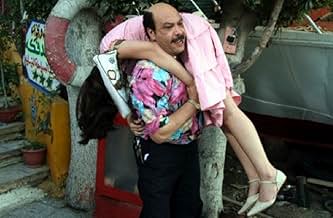Heya fawda
- 2007
- 2 घं 4 मि
IMDb रेटिंग
7.2/10
2.8 हज़ार
आपकी रेटिंग
अपनी भाषा में प्लॉट जोड़ेंEgyptian movie deals with the issue of corruption in Egypt and the Egyptian police excesses, embodies all of this in the character of the police officer, "Hatem".Egyptian movie deals with the issue of corruption in Egypt and the Egyptian police excesses, embodies all of this in the character of the police officer, "Hatem".Egyptian movie deals with the issue of corruption in Egypt and the Egyptian police excesses, embodies all of this in the character of the police officer, "Hatem".
- निर्देशक
- लेखक
- स्टार
- पुरस्कार
- 2 कुल नामांकन
फ़ीचर्ड समीक्षाएं
The movie describes the political issues at Egypt which need to change and the movie imagines that they are changed and solved .
Some people at Egypt count it as the best political movie at Egypt .
Some people at Egypt count it as the best political movie at Egypt .
I saw this at the 2008 Palm Springs International Film Festival. Cannes Film Festival Lifetime Achievement Award winner and longtime Egyptian director Youseff Chahine was in ill health toward the end of the filming of this picture thus the credit for Khaled Youssef as an additional director. The story takes place in modern day Cairo in a lower to middle class part of town called Shubra. Hatem (Khaled Saleh) is a tormented, sadistic, corrupt policeman who has the run of the local police station and the neighborhood. His weakness is an unrequited love for his neighbor, the beautiful Nour (Mena Shalaby). Nour is a schoolteacher at a nearby school and has her own unrequited love going for the handsome and kind District Attorney Sheriff (Youssef El Sheriff). Sheriff is unhappily in love with the beautiful Sylvia (Dorra Zarrouk) who is a drug taking, night clubbing, living in the fast lane, westernized opposite attraction to the straight-laced Sheriff. Nour shares an apartment with her mother Bahi (Hala Fakir) but also shares a mother-daughter relationship with her headmistress, the still beautiful Wedad (Hala Sedky) who is also Sheriff's mother. Wedad and Bahi share Nour's desire that someday Sheriff will drop Sylvia and marry Nour. It's a great cast with Khaled Saleh in a great screen role as the villainous and brutal Hatem. The Screenplay by Nasser Abdel Rahman is a little implausible at times but the over-the top story, direction and music seem to work. Cinematography by Ramsis Marzouk, Editing by Ghanda Ezz El Din and Music by Yasser Abdel Rahman. This plays well to a western audience and there are some nicely woven comedic moments to the film's dark and sobering moments. I would recommend this and give it an 8.0 out of 10.
With the combined power of Youssef Chahine's fearless guts, and Khaled Youssef's spectacular narrative style, "Heya Fawda" can only be perceived as a cinematic up-boost to Egyptian Cinema. Both directors reveal their touches in this socio-political story, by addressing wide-spread concerns in Egyptian society, yet through a moving drama, manipulated by a story-line that contradicts the pessimistic perception of Egyptians as passive and manipulated by the dominance of corruption and oppression.
The plot takes us through the different desires of life, starting from power and self-fulfillment, to love and its different forms ranging from the innocence of virginity, to the sadistic extreme of possession. Nonetheless, it contemplates the definition of a villain by arousing paradox feelings in regards to societal and psychological changes driven by one's background, loss, and deprivations, and the justification to those ends. The film portrays society in its turning points... From a psychoanalytical retrospect, Hatem, resembling Darwin's child who lives their entire life oppressed by the fear of castration and is driven by his lust for such needs until they erode even the purest of his sentiments, pushing him into society's greatest evils. However, the political implications of Hatem's character run beyond that to reveal the part of society that is reluctant to change; that by which the darkness of capitalism have disrupted forever and turned everything in it into "chaos". On the other hand, Nour and Cherif's characters reveal the future, or the dream of one... They both live the nightmare and are poisoned by the same water, yet they rise upon that and raise their voices higher than the pollution eating up the hopes of an improved tomorrow... Even when they're at their utmost break, they find a way to fight the havoc and see a glimpse of justice and light to the fatal incidents that dominate their lives, or in the bigger picture, society.
There is no doubt that Chahine and Youssef's merging together, brings out the best in them. "Heya Fawda" is one of the few Arabic movies that are reluctant to the melodramatic exaggerations, which turn the film into an obnoxious experience that offends the viewers' intelligence; nonetheless, the deep metaphors give a further meaning to this multi-genre movie making it almost complete. The film is rather a documentary encapsulating passion, suspense, politics, drama, and psychoanalysis in a few hours; it is simply the "Egyptian Society" uncovered.
The plot takes us through the different desires of life, starting from power and self-fulfillment, to love and its different forms ranging from the innocence of virginity, to the sadistic extreme of possession. Nonetheless, it contemplates the definition of a villain by arousing paradox feelings in regards to societal and psychological changes driven by one's background, loss, and deprivations, and the justification to those ends. The film portrays society in its turning points... From a psychoanalytical retrospect, Hatem, resembling Darwin's child who lives their entire life oppressed by the fear of castration and is driven by his lust for such needs until they erode even the purest of his sentiments, pushing him into society's greatest evils. However, the political implications of Hatem's character run beyond that to reveal the part of society that is reluctant to change; that by which the darkness of capitalism have disrupted forever and turned everything in it into "chaos". On the other hand, Nour and Cherif's characters reveal the future, or the dream of one... They both live the nightmare and are poisoned by the same water, yet they rise upon that and raise their voices higher than the pollution eating up the hopes of an improved tomorrow... Even when they're at their utmost break, they find a way to fight the havoc and see a glimpse of justice and light to the fatal incidents that dominate their lives, or in the bigger picture, society.
There is no doubt that Chahine and Youssef's merging together, brings out the best in them. "Heya Fawda" is one of the few Arabic movies that are reluctant to the melodramatic exaggerations, which turn the film into an obnoxious experience that offends the viewers' intelligence; nonetheless, the deep metaphors give a further meaning to this multi-genre movie making it almost complete. The film is rather a documentary encapsulating passion, suspense, politics, drama, and psychoanalysis in a few hours; it is simply the "Egyptian Society" uncovered.
'Chaos' is a simple but motivating film which not only gives us a glimpse of life in the busy city of Cairo in Egypt but also unwraps the supposed corruption that has infected law and order. The movie shows that the law enforcers can't abuse and twist the law for their own selfish purposes forever and that the strength of the people shall always bring down those who oppress the people.
The movie has displayed some amazing talent in Khaled Saleh "Hatem". The story shows how monsters like him get created. Although, there is considerable room for improvement both in the story and the acting, overall the performances are good and honest.
Do watch this good-defeats-evil movie not just for the story but for the overall great performances and its setting in the sultry city along the Nile.
The movie has displayed some amazing talent in Khaled Saleh "Hatem". The story shows how monsters like him get created. Although, there is considerable room for improvement both in the story and the acting, overall the performances are good and honest.
Do watch this good-defeats-evil movie not just for the story but for the overall great performances and its setting in the sultry city along the Nile.
All the reviews talk about this film from only a political point of view. Well i think this is not accurate. All these talking about the corrupted policeman "Hatem" who is a sign for the dictatorial political system and the combat between policemen and judgment and this girl "Noor" who is a model for the raped Egypt, well i think all these are not the point, or they are not the main point. I see the film from more human point of view. This man "Hatem" is a pathetic loser who lives a miserable lonely life, despite all the power he owns he has an extreme feeling of deprivation. He is a victim. "Noor" is a sign of what he needs to own. A beautiful young girl living in front of him, he knows her since she was a child and he never stops dreaming of her. What is the result? She is hating him! "Hatem" is not bad person. His inner emotions could be turned to something positive if he found love in return. The film talks mainly, in my opinion, about the chaos in feelings. Remember the relationship between "Sheriff" and his mother, and between "Sheriff" and "Selvia". They resemble an extreme undefined chaos. May be the message of the creators of the film is this: Chaos in feelings leads to chaos in the world. Finally i am not able to consider the film to be one of Chahine's films. Any one who likes Chahine will understand this point. This film has no Chahine's essence.It's well made and well directed but simply it's not Chahine's. you may feel a glimpse of Chaine's in the romantic love story between Sheriff and Noor, the relationship between Noor and her mother which will remind you of Lebleba and Hanan Tork in "The Other", you will also remember the old Chahine in the sexual mania of "Hatem" which also will remind you of the most famous "Qenaui" in "Bab el Hadeed". But as a total, you will not satisfy with the film if you put in mind that you are watching a Youssef Chahine's film.
क्या आपको पता है
- ट्रिवियाThe movie title was originally "Chaos, it is", yet the Egyptian censorship requested an addition of "?" at the end so it'll be like a question not an affirmation. The main theme of the movie is the chaos, corruption and brutality by the Egyptian police.
- कनेक्शनEdited into Les pharaons de l'Egypte moderne: Moubarak (2016)
टॉप पसंद
रेटिंग देने के लिए साइन-इन करें और वैयक्तिकृत सुझावों के लिए वॉचलिस्ट करें
- How long is Chaos, This Is?Alexa द्वारा संचालित
विवरण
- रिलीज़ की तारीख़
- कंट्री ऑफ़ ओरिजिन
- आधिकारिक साइटें
- भाषा
- इस रूप में भी जाना जाता है
- Chaos, This Is
- फ़िल्माने की जगहें
- उत्पादन कंपनियां
- IMDbPro पर और कंपनी क्रेडिट देखें
बॉक्स ऑफ़िस
- बजट
- $20,00,000(अनुमानित)
- दुनिया भर में सकल
- $1,44,357
- चलने की अवधि2 घंटे 4 मिनट
- रंग
- पक्ष अनुपात
- 1.85 : 1
इस पेज में योगदान दें
किसी बदलाव का सुझाव दें या अनुपलब्ध कॉन्टेंट जोड़ें


























